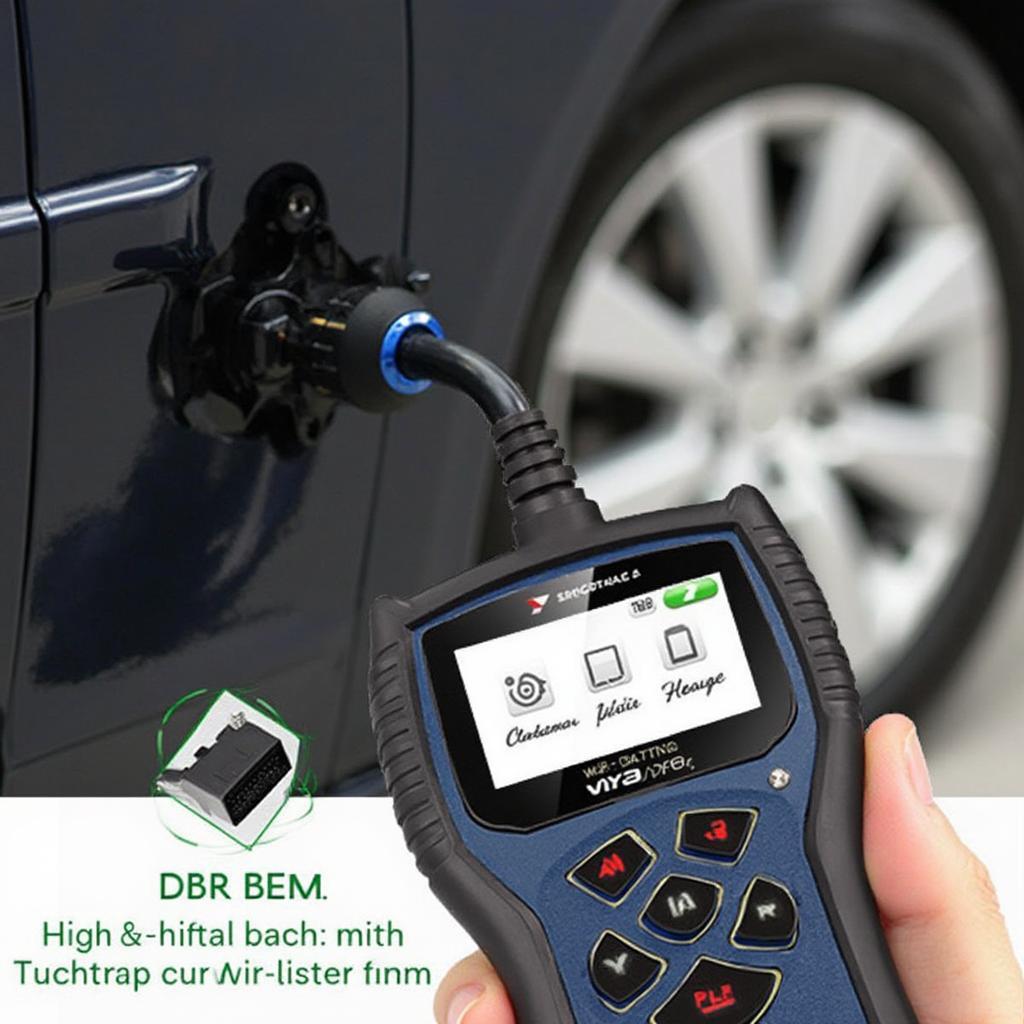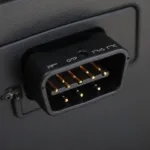OBD2 testers are essential tools for anyone who owns a car. Whether you’re a professional mechanic or a DIY enthusiast, understanding and utilizing these diagnostic powerhouses can save you time, money, and headaches. This guide dives deep into the world of OBD2 testers, exploring their functionality, benefits, and how to choose the right one for your needs.
Understanding the Power of OBD2 Testers
OBD2, or On-Board Diagnostics 2, is a standardized system that allows you to access your vehicle’s computer and retrieve diagnostic information. An OBD2 tester acts as the bridge between you and this system, providing insights into your car’s health and performance. These testers can identify a wide range of issues, from minor sensor malfunctions to more serious engine problems. They empower you to take proactive steps in maintaining your vehicle and avoid costly repairs down the line.
 OBD2 Tester Connected to Car's Diagnostic Port
OBD2 Tester Connected to Car's Diagnostic Port
Why You Need an OBD2 Tester
Think of an OBD2 tester as your car’s personal doctor. Just like regular checkups can prevent health issues in humans, regular diagnostics with an OBD2 tester can help keep your car running smoothly. Here’s why every car owner should consider investing in one:
- Early Problem Detection: Catch potential problems early before they escalate into major repairs.
- Save Money on Repairs: By identifying the root cause of issues, you can avoid unnecessary and expensive guesswork by mechanics.
- Improved Fuel Efficiency: Diagnosing and fixing problems related to fuel consumption can significantly improve your mileage.
- Enhanced Car Performance: Identify and address performance issues to ensure optimal engine function.
- Greater Control Over Your Vehicle: Gain a deeper understanding of your car’s inner workings.
Choosing the Right OBD2 Tester
Not all OBD2 testers are created equal. With a wide range of options available, selecting the right one can feel overwhelming. Consider these factors when making your decision:
- Compatibility: Ensure the tester is compatible with your car’s make, model, and year. Most modern cars (post-1996) are OBD2 compliant.
- Functionality: Basic code readers will retrieve and clear error codes, while more advanced tester obd2 profesional offer live data streaming, bi-directional control, and other advanced features.
- User-Friendliness: Look for a tester with an intuitive interface, clear display, and easy-to-understand instructions.
- Budget: OBD2 testers range in price from affordable basic models to high-end professional tools. Determine your budget and choose a tester that offers the best value for your needs.
What are the different types of OBD2 testers?
There are several types of OBD2 testers available, each with varying capabilities. From basic code readers to professional-grade scan tools, understanding these differences is crucial for making the right choice. For example, a bosch obd2 tester is known for its reliability and advanced features.
- Code Readers: These entry-level testers are primarily designed to retrieve and clear diagnostic trouble codes (DTCs). They are a cost-effective option for basic diagnostics.
- Scan Tools: Scan tools provide more comprehensive diagnostic capabilities, including live data streaming, sensor readings, and advanced functionalities like ABS and airbag system diagnostics.
- Professional Scan Tools: These high-end testers are typically used by professional mechanics and offer the most comprehensive diagnostics, including bi-directional control, programming capabilities, and access to manufacturer-specific codes.
Using an OBD2 Tester
Using an OBD2 tester is generally straightforward. Locate your car’s OBD2 port (usually under the dashboard), plug in the tester, and turn on the ignition. The tester will then communicate with your car’s computer and retrieve diagnostic information.
What do the codes mean?
Understanding the diagnostic trouble codes (DTCs) retrieved by the tester is crucial. These codes are standardized and provide insights into the specific issues detected. Consult a reliable online database or your car’s service manual to decipher these codes. Some testers, like the obd2 tester vag, are specifically designed for certain car manufacturers and can provide more detailed information.
Conclusion
OBD2 testers are invaluable tools for maintaining and troubleshooting your vehicle. From detecting problems early to saving money on repairs, these diagnostic powerhouses empower car owners with the knowledge and control they need to keep their vehicles running smoothly. Investing in the right obd2 tester price can significantly impact your car ownership experience. Consider your needs, budget, and the available features when choosing an OBD2 tester and unlock the potential of this powerful diagnostic tool.
FAQ
- What is an OBD2 tester?
- How do I use an OBD2 tester?
- Where can I find my car’s OBD2 port?
- What are diagnostic trouble codes (DTCs)?
- How do I choose the right OBD2 tester for my car?
- Can an OBD2 tester reset my check engine light?
- Are all cars OBD2 compliant?
For further information on specific testers, you might find our articles on obd2 tester capable of resetting transmission codes for vw helpful.
Need assistance? Contact us via WhatsApp: +1(641)206-8880, Email: [email protected] or visit us at 789 Elm Street, San Francisco, CA 94102, USA. Our customer support team is available 24/7.
